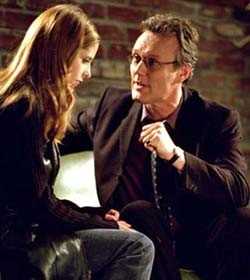| Why is it that so many people have overlooked the idea of a male watcher, who essentially controls Buffy's life, in favor of seeing Buffy as an independent female heroine who doesn't need males to be strong and powerful? Perhaps we can consider preferred reading, which leads audiences to come to a conclusion based on the most popular consensus (Rose, 98). In other words, audiences will overlook this male dominance because they probably see it as normal - because we have been culturally brought up to think that other people (often males) have the ability to control our lives. This, then, renders Giles' role as Buffy's guide completely normal; and this is why it is often overlooked. However, it is important to remember that "in [Buffy], the women are all controlled and formed by men. Men give them their strength, help them to channel whatever power they have, and are always lurking, either as potential lovers, as controlling father figures or bosses, as potential threats, or sometime all three at once" (Magoulick, 7). |
 |



